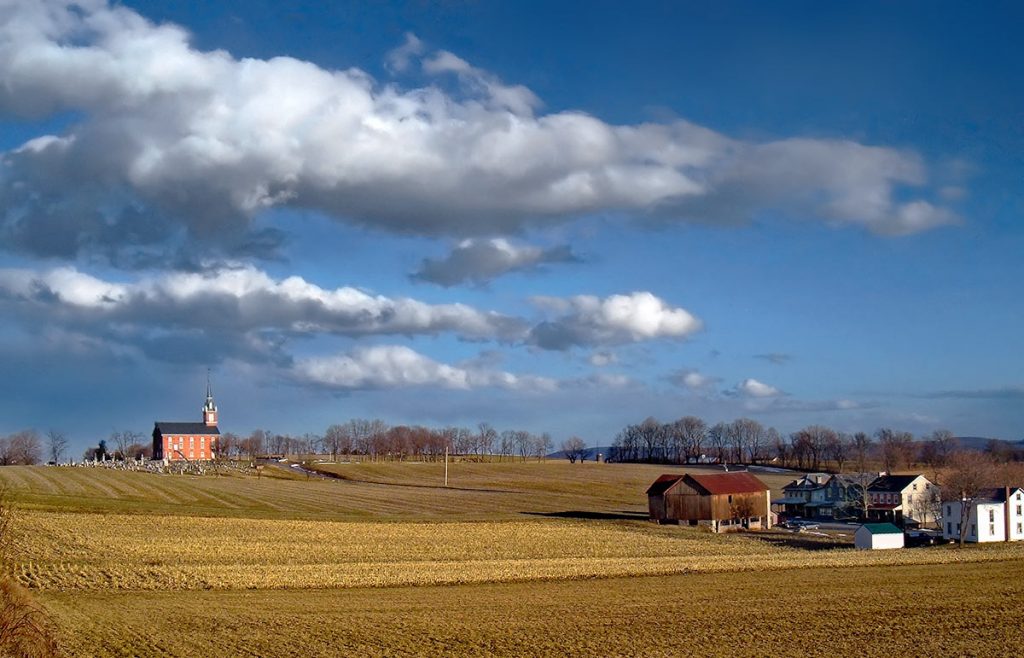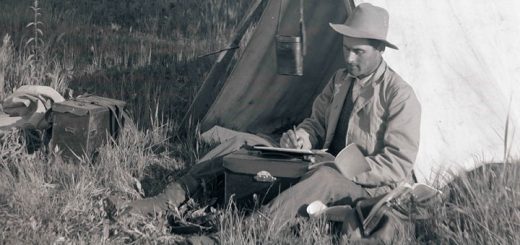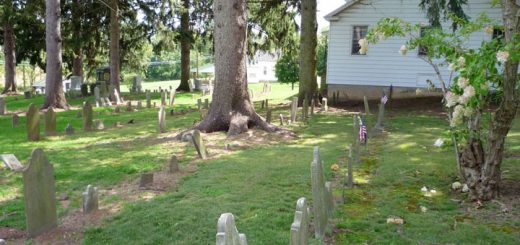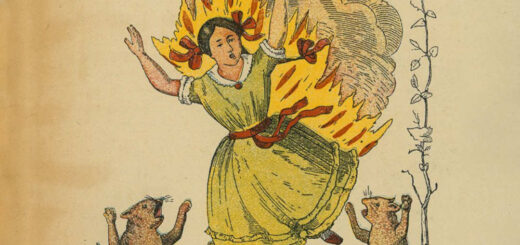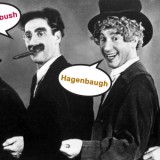1789 Essay on the Pennsylvania Deitsch, Part 3
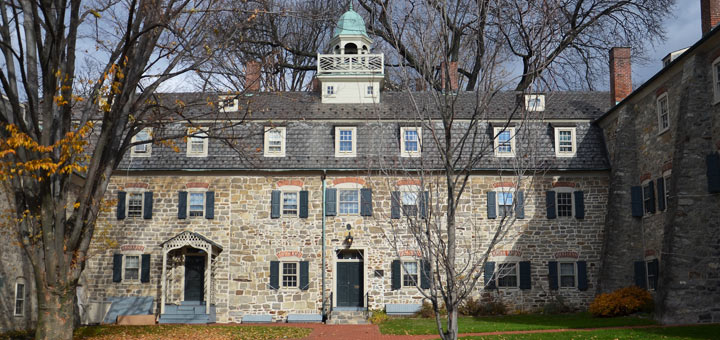
In the first and second parts of the essay, An Account of the Manners of the German Inhabitants of Pennsylvania, Benjamin Rush proposed a list of the key characteristics of Pennsylvania’s Deitsch citizens. He then went on to discuss their various religious practices and denominations.
Below is the third and final part of Rush’s account. It begins by concluding the description of Deitsch religious sects and ends with a message to legislators regarding the important contributions of these people to the newly formed United States.
An Account of the Manners of the German Inhabitants of Pennsylvania
(Continued from Part 1 and Part 2)
The German Moravians are a numerous and respectable body of Christians in Pennsylvania. In their village of Bethlehem, there are two large stone buildings where the different sexes are educated in the habits of industry in useful manufactures. The sisters (for by that epithet the women are called) all sleep in two large and neat apartments. Two of them watch over the rest, in turns every night, to afford relief from those sudden indispositions which sometimes occur in the most healthy persons in the hours of sleep. It is impossible to record this fact without pausing a moment to do homage to that religion, which produces so much union and kindness in human souls. The number of women who belong to this sequestered female society amounts sometimes to 120 and seldom less than 100. It is remarkable that notwithstanding they lead a sedentary life and sit constantly in close stove rooms in winter, that not more than one of them upon an average dies in a year. The disease which generally produces this annual death is the consumption. The conditions and ages of the women of the village, as well as of the society that has been mentioned, are distinguished by ribbons of a peculiar kind which they wear on their caps: the widows, by white; the married women, by blue; the single women, above 18 years of age, by pink; and those under that age, by a ribbon of a cinnamon color.
Formerly this body of Moravians held all their property in common in imitation of the primitive Christians. But, in the year 1760, a division of the whole of it took place, except a tavern, a tanyard, 2000 acres of land near Bethlehem, and 5000 acres near Nazareth – a village in the neighborhood of Bethlehem. The profits of these estates are appropriated to the support and propagation of the gospel. There are many valuable manufactures carried on at Bethlehem. The inhabitants possess a gentleness in their manners which is peculiarly agreeable to strangers. They inure their children of five and six years old to habits of early industry. By this means they are not only taught those kinds of labor which are suited to their strength and capacities, but are preserved from many of the hurtful vices and accidents to which children are exposed.
The Swingfielders are a small society. They hold the same principles as the Friends, but they differ from them in using psalmody in their worship.
The German Catholics are numerous in Philadelphia, and have several small chapels in other parts of the state.
There is an incorporated charitable society of Germans in Philadelphia, whose objects are their poor or distressed countrymen.
There is likewise a German society of laborers and journeymen mechanics who contribute 2 shillings 6 pennies eight times a year towards a fund, out of which they allow 30 shillings a week to each other’s families when the head of it is unable to work; and 71 pounds 10 shillings to his widow as soon as he is taken from his family by death.
The Germans of Pennsylvania, including all the sects that have been mentioned, compose nearly one third part of the whole inhabitants of the state.
The intercourse of the Germans with each other is kept up chiefly in their own language; but most of their men who visit the capital and the trading or county towns of the state speak the English language. A certain number of the laws of the state are now printed in German, for the benefit of those of those who cannot read English. A large number of German newspapers are likewise circulated through the state, by which knowledge and intelligence have been diffused much to the advantage of the government. There is scarcely an instance of a German of either sex in Pennsylvania who cannot read; but many of the wives and daughters of the German farmers cannot write. The present state of society among them renders this accomplishment of little consequence to their improvement or happiness.
If it were possible to determine the amount of all the property brought into Pennsylvania by the present German inhabitants of the state and their ancestors and then compare it with the present amount of their property, the contrast would form such a monument of human industry and economy as has seldom been contemplated in any age or country.
I have been informed that there was an ancient prophecy which foretold, that “God would bless the Germans in foreign countries.” This prediction has been faithfully verified in Pennsylvania. They enjoy here every blessing that liberty, toleration, independence, affluence, virtue, and reputation can confer upon them.
How different is their situation here from what it was in Germany! Could the subjects of the princes of Germany, who now groan away their lives in slavery and unprofitable labour, view from an eminence in the month of June the German settlements of Strasburg or Manheim in Lancaster county, or of Lebanon or Bethlehem in the counties of Dauphin and Northampton. Could they be accompanied on this eminence by a venerable German farmer and be told by him that many of those extensive fields of grain, full-fed herds, luxuriant meadows, orchards promising loads of fruit, together with the spacious barns, and commodious stone dwelling houses, which compose the prospects that have been mentioned, were all the product of the labor of a single family and of one generation; and that they were all secured to the owners of them by certain laws. I am persuaded that no chains would be able to detain them from sharing in the freedom of their Pennsylvania friends and former fellow subjects. “We will assert our dignity” – (would be their language) – “we will be men – we will be free – we will enjoy the fruits of our own labors – we will no longer be bought and sold to fight battles in which we have neither interest nor resentment – we will inherit a portion of that blessing which God has promised to the Germans in foreign countries – we will be Pennsylvanians.”
I shall conclude this account of the manners of the German inhabitants of Pennsylvania by remarking that if I have failed in doing them justice, it has not been the fault of my subject. The German character once employed the pen of one of the first historians of antiquity – I mean the elegant and enlightened Tacitus. It is very remarkable that the Germans in Pennsylvania retain in a great degree all the virtues which this author ascribes to their ancestors in his treatise De moribus Germanorum. They inherit their integrity, fidelity, and chastity. But Christianity has banished from them their drunkenness, idleness, and love of military glory. There is a singular trait in the features of the German character in Pennsylvania which shows how long the most trifling custom may exist among a people who have not been mixed with other nations. Tacitus describes the manner in which the ancient Germans built their villages in the following words: “Suam quisque domum spatiis circumdat sive adversus casus ignis remedium, sive inscitia aedificandi.” [Translation: Each man leaves a space between his house and those of his neighbors, either to avoid the danger from fire or from unskillfulness in architecture.]
Many of the German villages in Pennsylvania are constructed in the same manner. The small houses are composed of a mixture of wood, brick, and clay, neatly united together. The large houses are built of stone and many of them after the English fashion. Very few of the houses in Germantown are connected together. Where the Germans connect their houses in their villages, they appear to have deviated from one of the customs they imported from Germany.
CITIZENS of the United States! Learn from the account that has been given of the German inhabitants of Pennsylvania, to prize knowledge and industry in agriculture and manufactures, as the basis of domestic happiness and national prosperity.
LEGISLATORS of the United States! Learn from the wealth and independence of the German inhabitants of Pennsylvania, to encourage by your example and laws the republican virtues of industry and economy. They are the only pillars which can support the present constitution of the United States.
LEGISLATORS of Pennsylvania! Learn from the history of your German fellow citizens that you possess an inexhaustible treasure in the bosom of the state, in their manners and arts. Continue to patronize their newly established seminary of learning and spare no expense in supporting their public free schools. The vices which follow the want of religious instruction among the children of poor people lay the foundation of most of the jails and places of public punishment in the state. Do not contend with their prejudices in favor of their language: it will be the channel through which the knowledge and discoveries of one of the wisest nations in Europe may be conveyed into our country. In proportion as they are instructed and enlightened in their own language, they will become acquainted with the language of the United States. Invite them to share in the power and offices of government: it will be the means of producing a union in principle and conduct between them and those of their enlightened fellow citizens who are descended from other nations.
Above all, cherish with peculiar tenderness those sects among them who hold war to be unlawful. Relieve them from the oppression of absurd and unnecessary militia laws. Protect them as the repositories of a truth of the gospel, which has existed in every age of the church and which must spread hereafter over every part of the world.
The opinions respecting the commerce and slavery of the Africans, which have nearly produced a revolution in their favor in some of the European governments, were transplanted from a sect of Christians in Pennsylvania. Perhaps those German sects of Christians among us, who refuse to bear arms for the purpose of shedding human blood, may be preserved by divine providence as the center of a circle, which shall gradually embrace all the nations of the earth in a perpetual treaty of friendship and peace.

